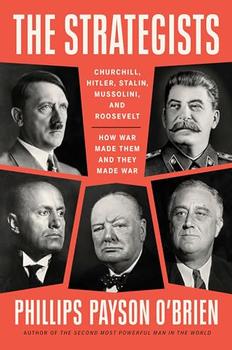
Churchill, Stalin, Roosevelt, Mussolini, and Hitler--How War Made Them and How They Made War
by Phillips Payson O'Brien
Churchill. Hitler. Stalin. Mussolini. Roosevelt. Five of the most impactful leaders of WW2, each with their own individualistic and idiosyncratic approach to warfare. But if we want to understand their military strategy, we must first understand the strategist.
In The Strategists, Professor Phillips Payson O'Brien shows how the views these five leaders forged in WW1 are crucial to understanding how they fought WW2. For example, Churchill's experiences of facing the German Army in France in 1916 made him unwilling to send masses of British soldiers back there in the 1940s, while Hitler's mistakes on the Eastern Front were influenced by his reluctance to accept that conditions had changed since his own time fighting. The implications of the power of leaders remain with us to this day: to truly understand what is happening in Ukraine, for example, requires us to know what has influenced the leaders involved.
This is a history in which leaders—and their choices—matter. For better or worse.
"[A] captivating study... . O'Brien's fluid prose makes for enchanting reading; there's never a dull moment ... . For military history buffs, this is a must-read." —Publishers Weekly (starred review)
"An exploration of grand strategy. Compelling." —Kirkus Reviews
"Phillips Payson O'Brien is one of our finest historical thinkers. The Strategists shows him at the height of his powers: a book full of deep perception, convincingly challenging many entrenched views and examining these five leaders that so shaped the modern world in an entirely fresh, brilliantly insightful and utterly compelling way. Everyone with an interest in not just the Second World War, but the twentieth century and beyond, should read this without delay." —James Holland, author of Normandy '44
This information about The Strategists was first featured
in "The BookBrowse Review" - BookBrowse's membership magazine, and in our weekly "Publishing This Week" newsletter. Publication information is for the USA, and (unless stated otherwise) represents the first print edition. The reviews are necessarily limited to those that were available to us ahead of publication. If you are the publisher or author and feel that they do not properly reflect the range of media opinion now available, send us a message with the mainstream reviews that you would like to see added.
Any "Author Information" displayed below reflects the author's biography at the time this particular book was published.
Phillips Payson O'Brien is a Professor of Strategic Studies at the University of St. Andrews in Fife, Scotland. Born and raised in Boston, he graduated from Trinity College in Hartford, Connecticut, before working on Wall Street for two years. He earned a PhD in British and American politics and naval policy before being selected as Cambridge University's Mellon Research Fellow in American History, and a Drapers Research Fellow at Pembroke College. Formerly at the University of Glasgow, he moved to St. Andrews in 2016. O'Brien is the author of The Second Most Powerful Man in the World and How the War Was Won.




The dirtiest book of all is the expurgated book
Click Here to find out who said this, as well as discovering other famous literary quotes!
Your guide toexceptional books
BookBrowse seeks out and recommends the best in contemporary fiction and nonfiction—books that not only engage and entertain but also deepen our understanding of ourselves and the world around us.